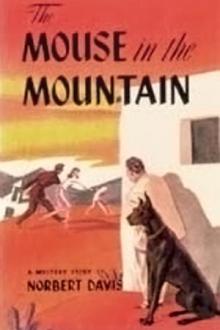Continuous Vaudeville by Will M. Cressy (read the beginning after the end novel .TXT) 📕

Read free book «Continuous Vaudeville by Will M. Cressy (read the beginning after the end novel .TXT) 📕» - read online or download for free at americanlibrarybooks.com
- Author: Will M. Cressy
Read book online «Continuous Vaudeville by Will M. Cressy (read the beginning after the end novel .TXT) 📕». Author - Will M. Cressy
Printer errors have been changed, and they are indicated with a mouse-hover and listed at the end of this book. All other inconsistencies are as in the original.
The first greyscale image has been provided as a thumbnail. A larger version is available by clicking on the image.
VAUDEVILLE
BY
WILL M. CRESSY
With Illustrations by
HAL MERRITT
BOSTON: RICHARD G. BADGER
TORONTO: THE COPP CLARK CO., LIMITED
Copyright, 1914, by Richard G. Badger
All Rights Reserved
The Gorham Press, Boston, U. S. A.
When you go into a Continuous Vaudeville Theater you expect to see and hear a little of everything. You see a lot of poor acts, a few good ones and two or three real good ones. In seeking a suitable title for this book it struck us that that description would fit it exactly; so we will christen it—
CONTINUOUS VAUDEVILLE.
CONTENTS PAGE The Old Stage Door Tender 13 It's Hard to Make the Old Folks Believe It 22 Union Labor 28 Martin Lehman Goes to New York 30 Some Hotel Whys 43 It Isn't the Coat that Makes the Man 45 One-Night-Stand Orchestras 48 "Heart Interest" 57 Tommie Ryan's Horse 60 Vaudeville vs. the Legitimate 70 A Social Session 75 Bigalow and the Big Six 81 Never Again 90 The Artistic Temperament 93 How Mike Donlin Shrunk 104 A Night in Bohemia 109 Breaks 120 The Difference Between New York and Canandaigua 123 Let Us Hope 127 The Old Ship of Zion 130 Fireman, Save My Child 137 Playing the English Music Halls 140 "Woodie" 151 A Cork Man 153 The Troubles of the Laugh Getters 159 Asleep with Her Switch 165 I Join the Suffragettes 168 The Perils of a Great City 174 Do You Believe in Signs? 177 Closing Number 180 ILLUSTRATIONS Mag Haggerty's Horse 60 "Shun Licker" 64 The Widow's Mite 66 Far from Home and Kindred 69 "Why?" 74 "Time All Open. Indefinite" 78 "Good Morning" 90 It Isn't the Coat that Makes the Man 107 "Vengeance is Mine" 117 One Sure (?) Fire Revolver 118 "Give 'Em the Gravy" 121 The Band of Hope 127 The Cressys in Ireland 153 Playing Hoboken 161 Carrying "The Old Man" with Her 162 "Bring Her Hither" 172 The Perils of a Great City 174[13]
THE OLD STAGE DOOR TENDERNaturally if you are going back on the stage to get acquainted with its people, the first chap you are going to meet is the old Stage Door Tender. You will find him at every stage door, sitting there in his old arm chair, calm, quiet, doing nothing; he is a man of few words; he has heard actors talk so much that he has got discouraged. He sees the same thing every week; he sees them come in on Monday and go out on Saturday; the same questions, the same complaints, the same kicks. So he just sits there watching, waiting and observing.
He seldom speaks, but when he does, he generally says something.
At the Orpheum Theater in Des Moines there was an old fellow who looked so much like the[14] character I portray in "Town Hall To-night" that everybody used to call him "Cressy." Finally we came there to play and he heard everybody call me "Cressy." He pondered over this for a day or two, then he came over to me one afternoon and said,
"What do you suppose they call you and I 'Cressy' for?"
He expressed his opinion of actors in general about as concisely as I ever heard any one do; I asked him what he really thought of actors; and with a contemptuous sniff he replied,
"I don't."
Nobody in the world could ever convince "Old George" on the stage door of the San Francisco Orpheum that that house would survive a year without his guiding hand and brain. Old George was hired by John Morrisey, the house manager, while Mr. Myerfelt, the president of the Orpheum Company, was abroad. George's instructions were to admit no one back on the stage without a written order from Mr. Morrisey. A month or so afterwards Mr. Myerfelt returned and started to go back on the stage.
[15]"Here, here," said Old George; "where are you going?"
"I am going up on the stage," said Mr. M.
"You are not," said George, barring the way, "without a pass from Mr. Morrisey."
"What are you talking about?" demanded Mr. M. "I am Mr. Myerfelt, the President of the Orpheum Company."
"Yis, and I am King George, The Prisidint of this Door; and me orders is that no one goes through here without a pass from Mr. Morrisey. And there is nobody goes through."
So deadly earnest is Old George in this matter that, should it be absolutely necessary for him to leave the door for a moment, he has bought himself a little child's-size slate upon which he writes out a detailed account of where he has gone, and why, and how soon he will be back.
"Gone to get a drink of water. Be back in a minute. George."
"Gone out in front to ask Mr. Morrisey a question. Be back in three minutes. George."
"Helping fill Miss Kellerman's tank; don't know how long. George."
"Inside watching Banner of Light Act. George."
[16]This "Banner of Light" act was Louie Fuller's "Ballet of Light," consisting of eight bare-legged girls dancing on big sheets of glass set into the floor of the stage. George would go in under the stage and watch the act up through these sheets of glass.
He said it was the best act that was ever in the house—for him.
Old "Con" Murphy was on the stage door of the Boston Theater for eighteen years; his hours were from 9 A. M. to 11 P. M., with an hour off for dinner and an hour for supper.
The theater faces on Washington Street and the stage door is on Mason Street. For eighteen years Con sat in that Mason Street door and only saw Washington Street once in all that time.
One day Eugene Tompkins, the owner of the theater, came along, stopped, thought a minute, then said,
"Con, how long have you been here?"
"Sixteen years, come August," said Con.
"Ever had a vacation?"
"No, sor."
Tompkins looked at his watch; it was ten minutes of twelve. "Well, Con," he said, "when[17] you go out to dinner, you stay out; don't come back until to-morrow morning. Then come and tell me what you did."
Con put on his coat and went out; out to the first vacation he had had in sixteen years; the first opportunity to see what this city he lived in looked like. The first chance he had had in sixteen years to get out into the country; to hear the birds sing; to see the green fields; the trees; the flowers growing.
And what do you suppose he did?
He walked across the narrow alley and visited with the Stage Door Tender of the Tremont Theater all the afternoon.
I asked the Stage Door Tender of Proctor's Twenty-third Street Theater in New York once what he considered the best act that ever played the house; unhesitatingly he replied,
"Joe Maxwell's Police Station act."
I asked him why he considered that the best.
"Ain't no women in it."
An agent for some fangled kind of typewriter was trying to interest the Stage Door Tender of Keith's Theater in Philadelphia in the machine:
[18]"Now this is just what a man in your position wants and needs. You have a lot of writing to do here, and nowhere to do it; now with this machine you don't require any table or desk; you can hold this typewriter right in your lap."
"Not me, Mister," said the Door Man hastily; "I'm married."
There used to be a door man at Keith's Boston House who could tell more in less words than any man I ever saw. One Monday morning some actors came in who had never been in Boston before, and they were asking this old fellow about the different hotels:
"How is the Rexford?" asked the Lady.
"Burlesque," grunted the old fellow.
"What is the Touraine?"
"Headliners."
"How about the So-and-so House?" naming quite a notorious hotel.
"Been open eleven years and had three trunks."
And the Judge at the prisoner leers;
"Why, I taught your daughter singing."
"You did?" said the Judge; "ten years."
[19]
Nat Haines was playing Keith's, Providence, R. I. The act on ahead of Nat was Professor Woodward's Trained Seals. One afternoon Nat, hearing a noise, looked around and there was one of the seals coming out under the curtain behind him. It took Nat just two jumps to get off the stage. An attendant came out and captured the seal. Nat came back. "Well," he said, scratching his head; "I have followed every animal on earth but a skunk and a lizard, and now I have got that. Humph; Professor Woodward's Trained Shad. I think I will learn dressmaking."
I once asked Ezra Kendal how he ever kept track of those seven children of his.
"I use the card-index system," he replied solemnly.
The Depths of Degradation: A man that plays second violin and double alto in the band.
Mary Richfield (Ryan & Richfield) had a headache; the Los Angeles sun had been too much for her. She went in to a drug store and asked the clerk for a headache powder. This clerk was not a first-class drugger; he was just a student;[20] but he knew where the headache powders were, so he got one for her; got his ten cents and started away. Mary looked around; there was no soda fountain, no water tank.
"Well, here," she said; the young man stopped and looked back at her. "Where am I supposed to take this powder?"
"In your mouth, Mam."
One cold, blustery day several of us were sitting in the stage door tender's little room at the Orpheum, Denver, when the door was thrown open and in hurried a boy of fifteen or sixteen.
"Where's Cressy?" he asked briskly.
"Right here," I answered in the same manner.
"I want a sketch."
"All right."
"What do you charge?"
"Five hundred dollars."
"Gee Zip!"
And he was out the door and gone.
At the Minneapolis Orpheum a chap with a jag came weaving his way out from the auditorium and over to the box-office window.
[21]"Shay," he said thickly; "wha' do you want to hire such bad acters for? They're rotten."
The ticket seller asked which ones he objected to.
"Why, tha' ol' Rube, and that gal in there; they're rotten."
"What are you talking about?" said the ticket seller; "that is Cressy and Dayne; they are the Headliners; they are fine."
The man looked at him a moment, as if to see if he really meant it; then he asked earnestly,
"Hones'ly?"
"Certainly."
For another moment he studied, then as he turned away, he shook his head sadly and said,
"I shall never go to another vaudeville show as long as I live."
[22]
IT'S HARD TO MAKE THE OLD FOLKS BELIEVE ITWe may be Actors and Actresses (with capital "A's") to the public; we may have our names in big letters on





Comments (0)